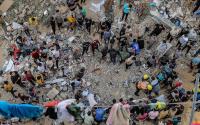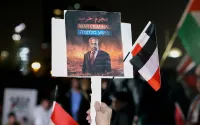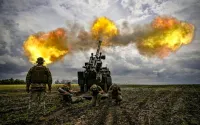Common Dreams / Published on Sunday, June 11, 2006 by the Boston Globe Charlie Savage
Three detainees at the Guantanamo Bay Navy Base in Cuba were found dead yesterday after committing suicide, marking the first prisoner deaths at the US military prison since it opened 4 1/2 years ago.
Guards discovered the three men -- two Saudi prisoners and a Yemeni -- just after midnight yesterday. They were hanging in their cells from nooses improvised from bedsheets and clothing, the Guantanamo prison commander, Rear Admiral Harry Harris, said in a conference call.
 Pentagon of?cials said the three men who committed suicide were held in the Guantanamo compound with the highest security. (Brennan Linsley/ Associated Press/ File 2006) Pentagon of?cials said the three men who committed suicide were held in the Guantanamo compound with the highest security. (Brennan Linsley/ Associated Press/ File 2006) |
Pentagon officials said the three men were in the compound with the highest security.
``The detainees we have here are dangerous men, committed to killing Americans on the battlefield," Harris said. ``They are smart. They are creative. They are committed. They have no regard for life -- either ours or their own. I believe this was not an act of desperation, but rather was an act of asymmetric warfare waged against us."
Lawyers for some Guantanamo detainees took a different stance, expressing outrage in their own conference call. They attributed the deaths to mounting frustration and hopelessness among the detainee population, most of whom have been held for four years without charges.
``Nobody should be surprised by this," said Josh Colangelo-Bryan, who witnessed his client attempt to hang himself in October and called guards to stop it. ``One of my clients told me that he would rather die than live there forever without rights."
Lawyer Anant Raut, in a separate interview, also reported a ``mounting sense of frustration and futility" among the detainee population.
``Unfortunately, maybe these three gave up hope and were hoping that through their deaths they can bring some more attention to the situation down there," he said.
Harris said none of the three detainees who were found dead had been represented by a lawyer, nor were any of them among the handful who have been charged with conspiracy to commit acts of terrorism before a military commission.
One of the men, Harris added, was a ``mid- to high-level Al Qaeda operative." Another had been involved in a prison uprising in Afghanistan, and a third was involved in another Middle Eastern group deemed to be terrorists. He declined, however, to offer any specific details about the men or the evidence against them.
White House spokesman Tony Snow said President Bush ``expressed serious concern" when he was told about the suicides. Bush, who is at Camp David this weekend, was told of the deaths by Secretary of State Condoleezza Rice.
The United States is currently holding about 460 people at Guantanamo. The government began transporting detainees there in January 2002, shortly after the terrorist attacks of Sept. 11, 2001, and the subsequent war to remove the Taliban in Afghanistan . More than 280 additional detainees have been released or transferred.
Numerous hunger strikes and suicide attempts have occurred at the prison over the past four years. But until yesterday, none had succeeded. The military has used force-feeding to keep those on hunger strikes alive, and Harris said all three of the detainees had been force-fed in the past.
Autopsies would be performed on the bodies, he said, and the circumstances of the deaths would be investigated independently by the Navy Criminal Investigative Service.
In Miami, General Bantz J. Craddock, the head of the US Southern Command, said that he did not know whether the detainees' remains would be interred at Guantanamo or sent home to Saudi Arabia and Yemen. He said the State Department was talking with those governments about how to handle the situation.
``The remains of the deceased detainees are being treated with the utmost respect," Craddock said. ``A cultural adviser is assisting . . . to ensure that the remains are handled in a culturally and religiously appropriate manner."
Former Army Captain James Yee, the onetime Muslim chaplain at Guantanamo, said in an interview yesterday that he had prepared detailed Muslim burial procedures when stationed at the base in 2002 and 2003.
Under the procedures, he said, if the military decides to bury the detainees at the base, the bodies would be washed and put in the ground wrapped in white sheets rather than placed in coffins, according to Muslim tradition.
The military has set aside a section in a base cemetery for Muslim use, Yee added. The base ordered U-shaped concrete covers to go over detainee bodies, making it easier to exhume them in case their remains were later sent to their home nations.
Muslim tradition usually calls for bodies to be buried with 24 hours of death, a timeline that could not be met because the bodies are undergoing autopsies. Harris said the military had obtained a fatwah, or religious ruling, from a ``reputable imam" that the 24-hour deadline could be waived when the cause of death is under investigation.
The suicides were the latest in a string of actions that have recently renewed global attention on the Guantanamo prison.
Last month, two detainees tried to kill themselves by taking overdoses of prescription medicines they had secretly hoarded. On the same day, a group of detainees ambushed guards in a separate part of the base.
Also last month, the United Nations Committee Against Torture called on the United States to close Guantanamo. And Britain's attorney general, Peter Goldsmith, said the prison ``should close" because it is an ``unacceptable" symbol of injustice.
Yesterday's suicides occurred a day after Bush, speaking to reporters at Camp David during a visit by the prime minister of Denmark, said his visitor had raised the issue of Guantanamo with him. Bush said that he, too, would like Guantanamo to be closed.
``We would like to end Guantanamo," Bush said. ``We'd like it to be empty. And we're now in the process of working with countries to repatriate people. But there are some that, if put out on the streets, would create grave harm to American citizens and other citizens of the world."
Bush said that such dangerous detainees ``ought to be tried in courts here in the United States." He said the administration was waiting on the Supreme Court to decide whether such detainees could be tried by military commissions -- a decision the court probably will make by the end of the month.
The Pentagon said it was postponing the scheduled military commission trial of Binyam Muhammad, an Ethiopian detainee, originally scheduled for this week. Muhammad is charged with conspiring with Osama bin Laden and other Al Qaeda leaders to attack civilians and commit other crimes.
Within hours, the suicides prompted diplomatic outreach by officials of the National Security Council, the State Department, and White House congressional liaisons.
Snow said administration officials contacted the UN, the European Union, the leaders of most European nations individually, the embassies of Mideast and near-Mideast countries, and the International Committee of the Red Cross. Also contacted were congressional leaders and the ranking members of the House and Senate Foreign Relations and Intelligence committees.
Snow said the Pentagon and the White House were working to investigate the matter and to determine whether all proper procedures were followed to prevent suicides. He said there was no direct indication that the suicides were connected to the killing last week of terrorist Abu Musab al-Zarqawi in a US air strike in Iraq.






